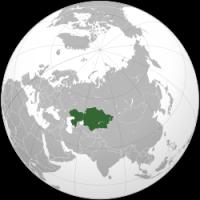|
|
|
Kazakhstan (c-enaudio=En-us-Kazakhstan ( , Qazaqstan, pronounced -kkqɑzɑqstɑ́n; -rukəzɐxˈstan), officially the Republic of Kazakhstan, is a transcontinental country in Central Asia and Eastern Europe. Ranked as the ninth largest country in the world, it is also the world's largest landlocked country; its territory of is greater than Western Europe. It is neighbored clockwise from the north by Russia, China, Kyrgyzstan, Uzbekistan, Turkmenistan, and also borders on a significant part of the Caspian Sea. Although Kazakhstan does not share a border with Mongolia, its most easterly point is only 38 km from Mongolia's western tip. The capital was moved in 1998 from Almaty (formerly Alma-Ata), Kazakhstan's largest city, to Astana. Kazakhstan is one of the six independent Turkic states. Kazakhstan is one of the active members of the Turkic Council and the TÜRKSOY community which is currently being directed by the former Minister of Culture of Kazakhstan. Vast in size, the terrain of Kazakhstan ranges from flatlands, steppes, taigas, rock-canyons, hills, deltas, and snow-capped mountains to deserts. With 16.6 million people (2011 estimate) Kazakhstan has the 62nd largest population in the world, though its population density is less than 6 people per square kilometre (15 per sq. mi.). For most of its history, the territory of modern-day Kazakhstan has been inhabited by nomadic tribes. By the 16th century, the Kazakhs emerged as a distinct group, divided into three Jüz. The Russians began advancing into the Kazakh steppe in the 18th century, and by the mid-19th century all of Kazakhstan was part of the Russian Empire. Following the 1917 Russian Revolution, and subsequent civil war, the territory of Kazakhstan was reorganized several times before becoming the Kazakh Soviet Socialist Republic in 1936, a part of the USSR. During the 20th century, Kazakhstan was the site of major Soviet projects, including Khrushchev's Virgin Lands campaign, the Baikonur Cosmodrome, and the Semipalatinsk "Polygon", the USSR's primary nuclear weapon testing site. Kazakhstan declared itself an independent country on December 16, 1991, the last Soviet republic to do so. Its communist-era leader, Nursultan Nazarbayev, became the country's new president. Since independence, Kazakhstan has pursued a balanced foreign policy and worked to develop its economy, especially its hydrocarbon industry. While the country's economic outlook is improving, President Nazarbayev maintains strict control over the country's politics. Nevertheless, Kazakhstan's international prestige is building. It is now considered to be the dominant state in Central Asia. The country is a member of many international organizations, including the United Nations, the Euro-Atlantic Partnership Council, the Commonwealth of Independent States, and the Shanghai Cooperation Organisation. Kazakhstan is one of six post-Soviet states who have implemented an Individual Partnership Action Plan with NATO. In 2010, Kazakhstan chaired the Organization for Security and Co-operation in Europe. Kazakhstan is ethnically and culturally diverse, in part due to mass deportations of many ethnic groups to the country during Stalin's rule. Kazakhstan has a population of 16.2 million, with 131 ethnicities, including Kazakh, Russian, Uyghur, Ukrainian, Uzbek, Tatar, and German. Around 63% percent are Kazakhs. Kazakhstan allows freedom of religion, and many different beliefs are represented in the country. Islam is the religion of more than 70% of the population, and Christianity makes up most of the remainder. The Kazakh language is the state language, while Russian is also officially used as an "equal" language (to Kazakh) in Kazakhstan's public institutions. According to Newsweek magazine the country holds the 61st position in the "The world's best countries" list. This summary index consists of following ranks: education � 14, health � 82, quality of life � 45, economic dynamism � 43, political environment � 81. The best rank is the first. According to World Economic Forum in Global Competitiveness Report on 2010 � 2011 year Kazakhstan holds the 72nd position. |




 RSS
RSS